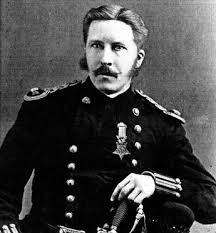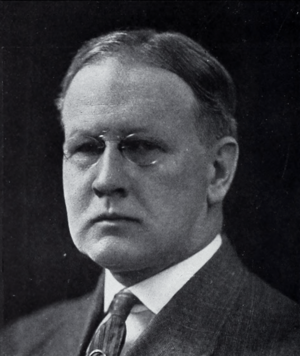Asa Bird Gardiner facts for kids
Quick facts for kids
Asa Bird Gardiner
|
|
|---|---|

Asa Bird Gardiner (1865)
|
|
| Born | September 30, 1839 Manhattan, New York City |
| Died | May 24, 1919 (aged 79) Suffern, New York |
| Place of burial |
Green-Wood Cemetery
|
| Allegiance | United States of America Union |
| Service/ |
United States Army |
| Years of service | 1861–1888 |
| Rank | Major |
| Battles/wars | Carlisle, Pennsylvania |
| Awards | Medal of Honor (Revoked) |
| Other work | District Attorney of New York County (removed from office) |
Asa Bird Gardiner (born September 30, 1839 – died May 24, 1919) was an American soldier and lawyer. He served as the top prosecutor, called a District Attorney, for New York County from 1898 to 1900.
He received the Medal of Honor, a very high military award, for his service in the American Civil War. However, this award was later taken back in 1917 because there wasn't enough proof to support it. As a lawyer for the United States Army, called a Judge Advocate, he was involved in some important legal cases.
Gardiner was elected District Attorney in 1897. He was later removed from his job by Theodore Roosevelt in 1900. He was known for not wanting to fight against corruption in New York City politics.
Contents
Early Life and Education
Asa Bird Gardiner was born in New York City on September 30, 1839. His original last name was "Gardner," but he legally changed it to "Gardiner" in 1884. He was born at Fraunces Tavern, a famous historic building, where his father and uncle ran an inn.
He studied hard and graduated from the City College of New York in 1859. He then earned a law degree from New York University School of Law in 1860. After that, he became a lawyer in New York City.
Serving in the Civil War
When the American Civil War began, Gardiner joined the army. He became a first lieutenant in the 31st New York Infantry Regiment in May 1861. He served for a few months before leaving that unit.
He later became a captain in the 22nd National Guard Infantry in May 1862. He served in Baltimore, Maryland, and finished that service in September 1862.
In June 1863, he rejoined the same regiment as a captain. This was when the Confederate army was moving towards Pennsylvania. Gardiner was part of battles at Sporting Hill and Carlisle, Pennsylvania. He was wounded at Carlisle, but it was not a serious injury. He left active service in July 1863.
In 1865, he joined the Veteran Reserve Corps as a first lieutenant. He served there until August 1866. He was also given an honorary rank of captain for his brave service during the war.
Medal of Honor Awarded and Taken Back
Asa Bird Gardiner received the Medal of Honor on September 23, 1872. This award was for his actions at the Battle of Sporting Hill. The medal recognized his "distinguished service" as a Captain.
However, in early 1917, a special review panel looked at his award. They found no evidence to support why he deserved the Medal of Honor. Because of this, Gardiner's award was officially taken back. Even though it was rescinded, he refused to return the medal.
After the Civil War: Military Career
After the Civil War, Gardiner continued his military career. He became a second lieutenant in the Regular Army in 1866. He was promoted to first lieutenant in 1868. He later transferred to the 1st Artillery Regiment.
He served as an aide to Major General Irvin McDowell. General McDowell was in charge of the Department of the East, located on Governors Island in New York Harbor.
In 1873, Gardiner was promoted to the rank of major. He then served as a Judge Advocate for 15 years. A Judge Advocate is a military lawyer who handles legal matters for the army. He retired from the Army in December 1888.
In 1874, the West Point military academy started a Department of Law. Gardiner was chosen to be its first law professor. He created the entire law program there. He even wrote a textbook for the students. He taught law at West Point from 1874 to 1878.
Important Legal Cases
During his time as a Judge Advocate, Gardiner was involved in several important legal cases.
In 1878, he was part of a group reviewing the case of Major General Fitz John Porter. Porter had been removed from the Army in 1863. Gardiner was criticized for acting more like a prosecutor than a neutral reviewer in this case.
In 1880, Gardiner was the prosecutor in the court-martial of Johnson Chesnut Whittaker. Whittaker was one of the first black cadets at West Point. He claimed he was attacked by other cadets. The academy said he faked the attack. Whittaker was expelled after the trial. However, the verdict was later overturned by President Arthur. In 1995, Whittaker was given a special honorary commission after his death.
New York Politics and Later Life
After retiring from the Army, Gardiner became a private lawyer in New York City. He also became active in New York City politics. He joined the Tammany Hall political group, which was a powerful part of the Democratic Party in the city.
In November 1897, Gardiner was elected as the New York County District Attorney. He took office on January 1, 1898. During his campaign, he was known for not wanting to fight against political corruption.
In December 1900, charges were brought against Gardiner. These charges claimed he interfered with legal cases related to elections. Governor Theodore Roosevelt removed Gardiner from his position later that month.
In 1908, Gardiner was hired by New York State for a legal case. He represented the state in a case about Harry K. Thaw. Thaw was a famous person who had been judged insane after a murder trial. Gardiner argued that Thaw could not be forced to testify in court because of his mental state.
On September 10, 1913, Gardiner gave a speech in Newport, Rhode Island. This was for the 100th anniversary of the Battle of Lake Erie. He was described as a very skilled speaker.
Military and Heritage Groups
Gardiner was very active in many military and heritage societies. These groups often connect people who share a military background or family history.
Some of the groups he belonged to include:
- The Society of the Cincinnati: This group was founded by officers who fought in the American Revolution. Gardiner was a key person in bringing the Rhode Island branch of this society back to life. He helped define its rules and recruit new members. He became the Secretary General of the national society in 1884. He also became president of the Rhode Island Society in 1899.
- The Military Order of the Loyal Legion of the United States
- The Grand Army of the Republic
- The Sons of the Revolution
- The Military Society of the War of 1812
- The Veteran Corps of Artillery of the State of New York
Because of his leadership roles in these groups, Gardiner was often called "Colonel Gardiner."
Family Life
Asa Bird Gardiner married Mary Austen in 1865. They had three sons: Asa Bird Jr., Philip, and Norman. Mary Austen Gardiner passed away in 1900. His son Philip served as a major in the Army during World War I. His son Asa Bird Gardiner Jr. took over his father's role in the Society of the Cincinnati.
In 1902, at age 63, Gardiner married Harriet Isabelle Lindsay. They had two more sons, John and William.
Death
Asa Bird Gardiner died on May 24, 1919, at his home in Suffern, New York. He was 79 years old. He was buried in Green-Wood Cemetery in Brooklyn. His headstone shows his rank as "CAPT" (Captain), even though he had been promoted to lieutenant colonel after he retired.
See also
 | James Van Der Zee |
 | Alma Thomas |
 | Ellis Wilson |
 | Margaret Taylor-Burroughs |


